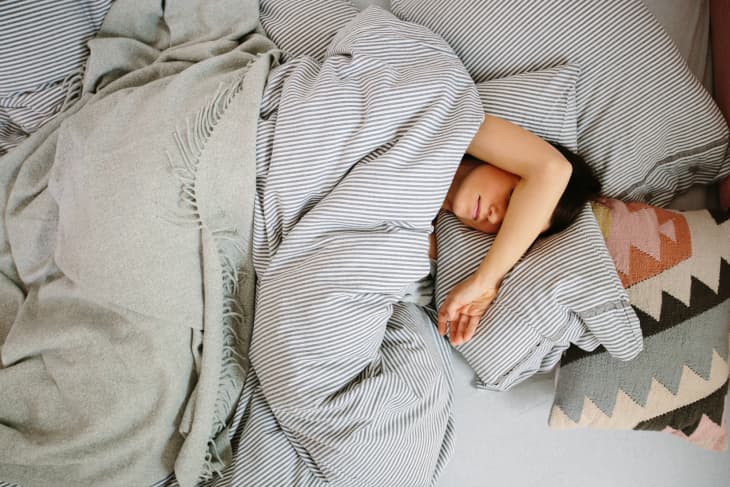7 Must-Have Items for Preventing Bed Bugs, According to Pest Control Pros

There’s nothing like snuggling into a cozy bed after a long, tiring day. Whether you spent your hours on vacation wandering through the streets of Italy or checking items off your to-do list at home, resting your weary head and drifting off to sleep is comforting — until you start thinking about bed bugs. And while this may be a concern while on the road, according to the experts, knowing how to prevent bed bugs at home is also essential.
If you’re unfamiliar with these critters, they’re scarily impressive (although admittedly creepy), and once they find an environment, they don’t want to leave. According to Natasha Kulinski of Beaver Pest Control, females can lay between 200 to 500 eggs in two months, which means you must act fast. “Treating bed bugs can be very tricky,” she says. “If you don’t notice and act quickly, you can have a much larger problem on your hands.”
The critters don’t just like to snuggle up in your bed — they’re also known to spread throughout a room, looking for other concealed locations. Bed bugs enjoy being close to humans to pilfer warmth and carbon dioxide, although they can go without both for quite a while. “Without people nearby, they can survive weeks or months in an inactive state waiting for a host to return to feed on,” adds Kulinski.
That’s enough information to give anyone the heebie-jeebies and send you scurrying to check your sheets, luggage, and other soft surfaces. However, there are ways you can prevent getting bed bugs in the first place. Here are seven products that professional pest control folks advise you to use to ensure you’re sleeping alone.
Mattress Encasements
Although Benjamin Franklin wasn’t referencing bed bugs when he said that “an ounce of prevention is worth a pound of cure,” it’s undoubtedly the best attitude for keeping these small insects at bay, especially concerning your bedding. Although mattress covers can’t treat bed bugs, they can prevent them from entering your space. “Mattress encasements do not control bed bugs, but used as a preventative can keep bed bugs out of the mattress and box spring,” says Bob Gilbert, an entomologist with Blue Sky Pest Control. He also adds that even if an infestation occurs, it is easier to control and treat if the mattress has an encasement.
Alcohol Sprays
Like most other living things, bed bugs contain a lot of water, and an alcohol spray can dehydrate and kill these pests. As the CEO of Black Pest Prevention, Nicole Carpenter recommends sprays because they align with her company’s eco-friendly practices. “First and foremost, alcohol sprays, which you can acquire from local natural health shops or online sources, prove remarkably effective in swiftly dealing with bed bugs on contact,” she says. It’s an economical way to prevent an infestation if you see one or two insects milling around in your space.
Luggage Liners
A strong barrier between bugs and your items is beneficial when traveling. Even if a place seems clean and tidy, the last guest may have left behind an undetected bed bug. Gilbert says, “The use of a sealed luggage liner when traveling can prevent bed bugs from getting into your belongings.” Although leaving your suitcase open for easy access may be tempting, it’s best to close and zip it when it’s not in use (and keep it in the bathroom, if you can).
Diatomaceous Earth
Mohamed Samir of Bugwise Pest Control recommends diatomaceous earth as another natural solution that attacks the exoskeleton to dehydrate and kill bugs. “Microscopic sharp edges cut the bugs, causing them to dry out,” he says. According to Samir, this strategy is highly effective, especially when placed strategically, where bed bugs are likely to traverse. As they walk through, their bodies collect and eventually react to the diatomaceous earth, causing death.
Essential Oils
Another natural solution Carpenter offers is using essential oils to combat pesky critters. “When journeying, harness the power of essential oils, such as lavender and peppermint,” she recommends. Make a solution by diluting the oil with water and putting it into a 100-milliliter or smaller bottle with a spray attachment. Then, spray your luggage and bedding periodically throughout your trip to make soft surfaces unattractive to bed bugs.
Insect Repellant
If you’ve been camping or spent time outdoors in the summer, you may have used a bug spray containing DEET. Using an insect repellant with this ingredient can help repel bugs for up to three days. The downside for some people is the scent. “Although DEET does have a strong smell, it is the gold standard for insect repellency, including bed bugs, when treated directly onto fabric,” advises Gilbert.
Furniture Traps
Although it seems simple, one of the best ways to keep bed bugs from scurrying up your bedposts is to trap them before they can make their way up. Several pest control experts I spoke to recommended ClimbUp interceptors, which capture climbing bed bugs. Place each foot of your soft furniture pieces, such as beds and sofas, into an interceptor, which will trap the bugs so they can’t go anywhere else.